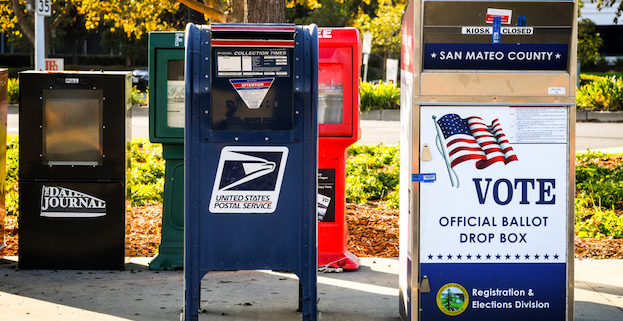News
CA’s 2022 mid-term elections may bring surprises to Democrats
 Ballot boxes in Foster City for the November 2020 general election. (Photo: MariaX, via Shutterstock)
Ballot boxes in Foster City for the November 2020 general election. (Photo: MariaX, via Shutterstock)Democrats are hearing alarm bells for California’s congressional races in 2022.
The state’s House delegation – now at 53, but likely to drop by one seat after the new redistricting – stood at 46 Democrats and only seven Republicans after the 2018 elections.
But last year, Republicans captured four seats from Democrats — which caught political observers by surprise.
Even the loss of a handful of congressional seats in this state can have a profound effect on the balance of power in the 435-member House of Representatives
California’s congressional delegation will remain solidly Democratic, as will statewide offices and the Legislature.
But even the loss of a handful of congressional seats in this state can have a profound effect on the balance of power in the 435-member House of Representatives, now narrowly controlled by Democrats by a margin of only 10 seats, 221-to-211.
Mike Garcia (CA-25), Young Kim (CA-19), David Valadao (CA-21) and Michelle Steel (CA-48) overcame top-of-the-ticket drag to win.
Mid-term elections often reflect losses sustained by the party in power, which means the 2022 congressional elections may see further Democratic losses.
More than four out of five eligible Californians went to the polls for the Nov. 3 general election, about 80.7 percent, according to the state’s elections officer. It was the highest turnout since 1952, Biden beat Donald Trump by about 30 points, a margin of more than five million votes.
In the four districts that Republicans flipped, Biden won all of them.
High turnout often translates into Democratic gains, but that typically refers to statewide and national races. The local congressional contests, district by district, may have a different dynamic.
“I think that if you had gone in saying that turnout was going to be above 80 percent in some of these districts, that people would just assume that it was going to be a massive Democratic wave,” said veteran political consultant Andrew Acosta. “Message matters, candidates matter.”
In the four districts that Republicans flipped, Biden won all of them.
In CA48, he won by 1.48% and by 10.1% in CA25, a contest that captured national headlines when Republican Garcia won by 333 votes. In CA39, Biden won 10.15%, while in CA21, he won by 10.87%
Garcia, Kim and Valadao all won their local races in districts that voted for Biden by wider percentage margins than Virginia, New Hampshire, and Minnesota.
“Clearly some people are gonna say, ‘I’m done with the Trump politics but I like the local Republican candidate.’” — Andrew Acosta
“When a lot of these Democrat incumbent members of congress were talking about Trump or trying to nationalize the issues … they were ignoring local issues that really make a difference in the quality of life for these voters,” said Sam Oh of Targeted Victory and a chief consultant for both the Kim and Steel campaigns. “That led to a situation where dynamic candidates like Valadao, Steel, and Kim were able to capitalize on crossover votes,”
“Clearly some people are gonna say, ‘I’m done with the Trump politics but I like the local Republican candidate,’” Acosta noted. “People sort of fell into this trap, especially after 2018, that just saying ‘Trump’ three times is going to win you the race, and then (they) were surprised that Democrats didn’t do as well in some areas that they assumed would be repeats of 2018.”
Steel and Kim are both immigrants from South Korea, Valadao is the son of Portuguese immigrants. Their respective backgrounds may have helped them gain authority when speaking on immigration issues. Garcia, a former Navy pilot, ran on a strong military, deregulation and lower taxes.
If Republicans continue to allow their candidates in congressional races autonomy from the national brand and platform, they could make inroads into Democratic strongholds.
Considering that the 39th, and 48th districts both contain substantial Asian-American minority populations, and the 21st is a majority Hispanic district, these Republican challengers apparently were able to relate to the voters in a way that other candidates didn’t.
In the 2022 midterm elections, President Biden’s first two years in office will be on the ticket.
If Republicans continue to allow their candidates in congressional races autonomy from the national brand and platform, they could make inroads into Democratic strongholds, possibly even regaining control over the narrowly-divided House of Representatives.
Conventional wisdom suggests that Democrats may on the defensive in two years during the first midterm election of the Biden administration.
However, as the 2020 elections have shown, conventional wisdom can be wrong.
—
Editor’s Note: James Aranguren is a Capitol Weekly intern from the University of Southern California
Want to see more stories like this? Sign up for The Roundup, the free daily newsletter about California politics from the editors of Capitol Weekly. Stay up to date on the news you need to know.
Sign up below, then look for a confirmation email in your inbox.

Leave a Reply